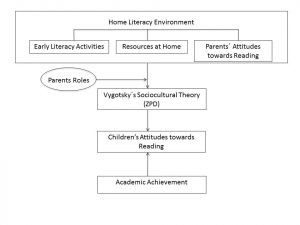Home Literacy Environment
- Research has shown a consensual pattern of impact and the importance of the home literacy environment in the acquisition of literacy. Read more (1).
- Parents’ own literacy habits influence children’s interest and motivation for reading. Read more (2).
- Practice of joint-book reading between parent and child influence on literacy outcomes. Read more (3).
- Family conversations around mealtime are another opportunity that can expose children to literacy development. Read more (4).
- Story telling is a valuable resource in Africa that is vital in promoting literacy skills, especially reading comprehension. Read more (5).
- Other factors that may affect home literacy environment. Read more (6).
Figure 1.

How teachers can support parents?
- Collaborate with parents.
- Give concrete examples to the parents. (link to – tips!)
- Introduce parents to local possibilities to access books.
- Introduce to the parents your reading aims and the way you teach reading.
- If the child has problems in learning to read, teachers need to emphasize the use of classroom language also at home.
- As some parents may be illiterate, this would be an opportunity for them to also learn basic literacy skills.
What the parents can do?
5 steps
- Read to the child.
- Read with the child.
- Listen when the child is reading aloud.
- Discuss about the book or text that has been read.
- Go to the public library with the child or encourage the child to read in school library.
– NOTE from eBooks – a link to materials e.g. www.africanstorybook.org

